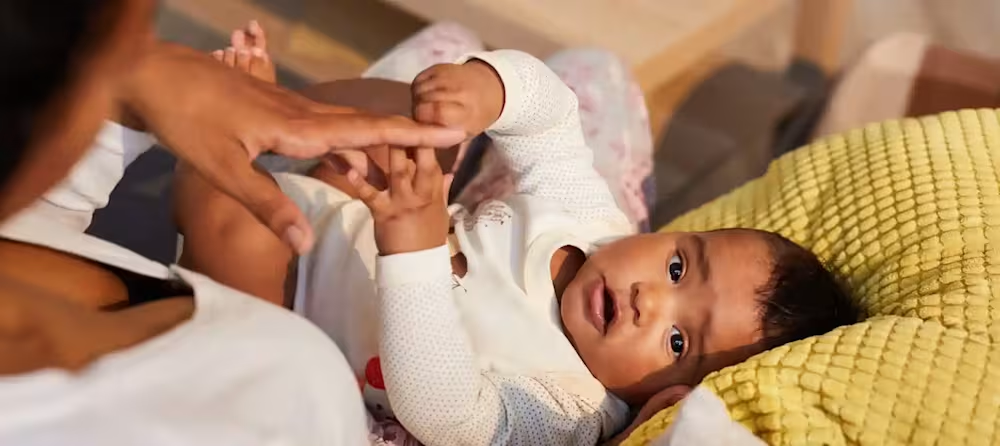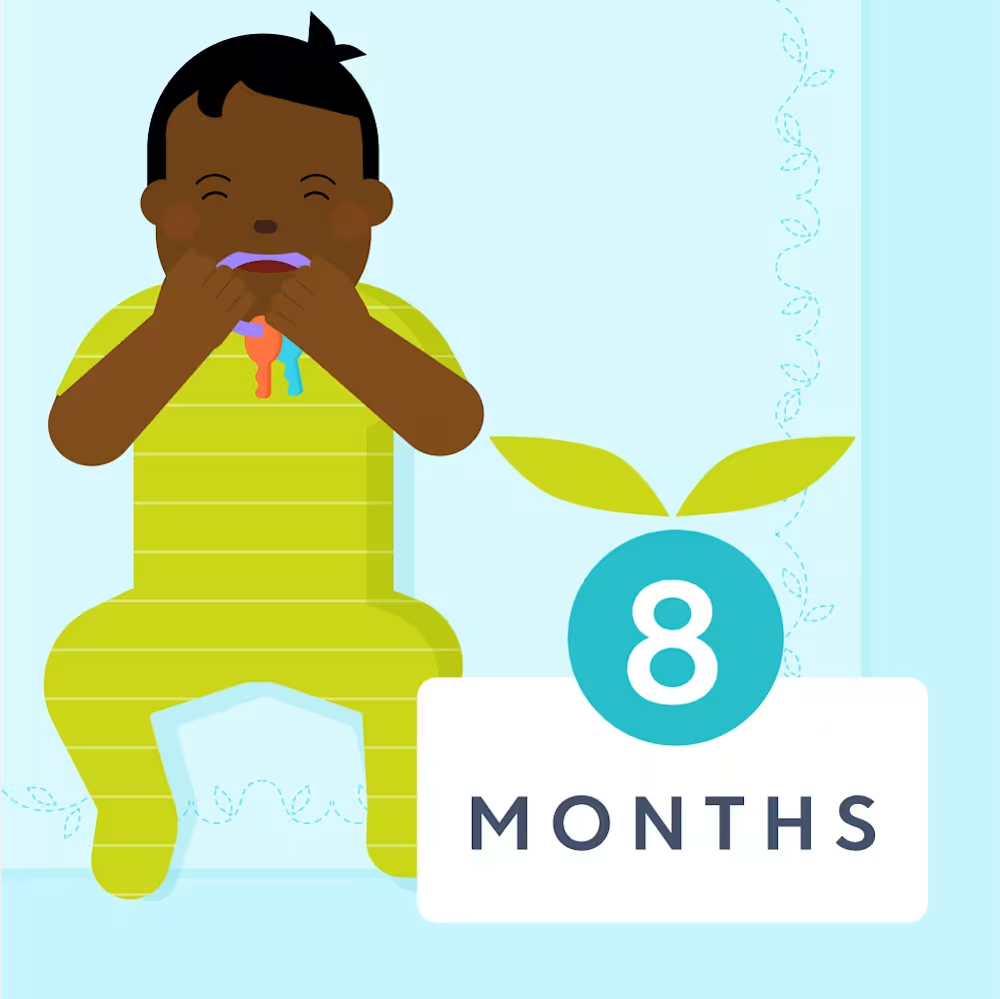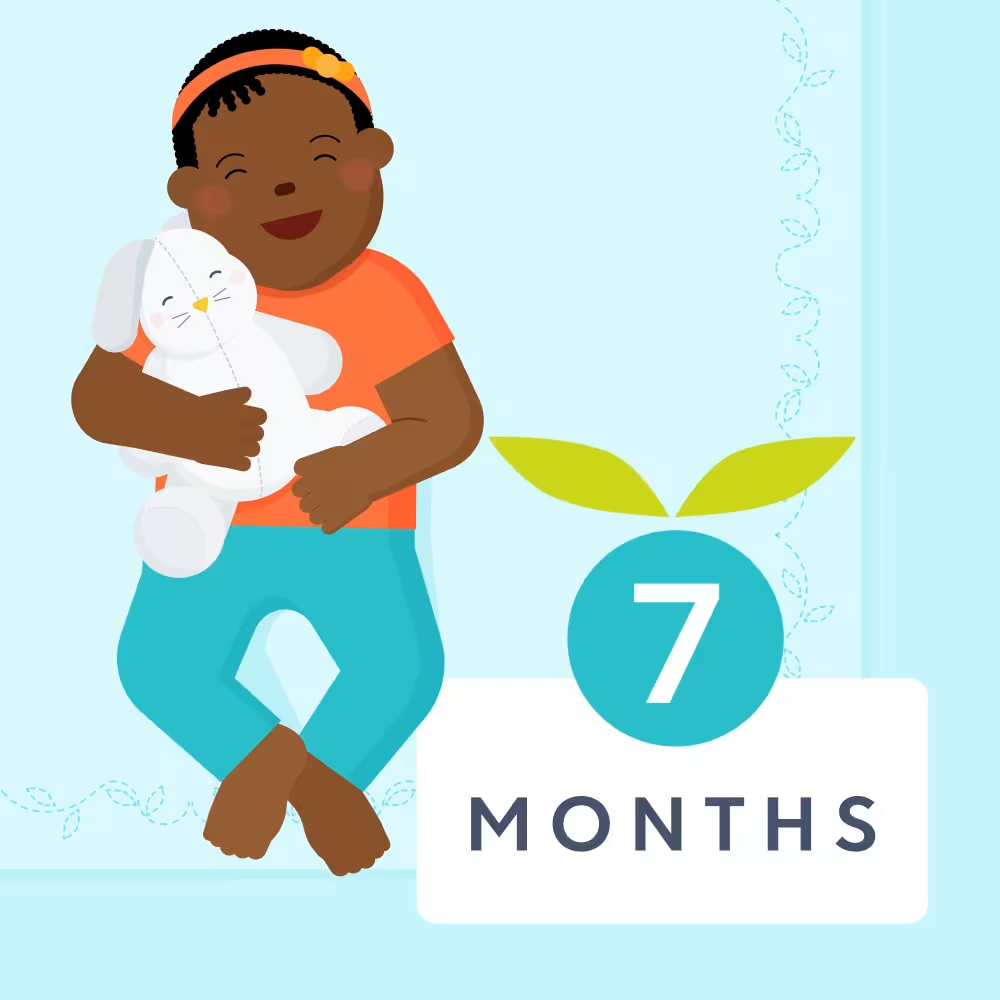8 month sleep regression: What causes it and what to do
Updated Dec 16, 2025

Have you been frantically googling “8 month sleep regression” to figure out why your little sleeper has suddenly been waking up at night again and decided naps are overrated? While sleep regressions can happen at any age, 8 - 9 months is a common time for little ones to go through a patch of bumpy sleep. In this article, we’ll walk you through reasons why this happens and offer parent tips to help get sleep back on track.
What is the "8 month sleep regression"?
If your baby's suddenly not sleeping — waking at night more often or taking shorter naps, for example — it’s often referred to as a sleep regression. While there’s no set date on the calendar that dictates sleep regressions, many babies experience a noticeable shift in sleep patterns around 8 months — hence the term “8-month sleep regression.” Between 7 - 10 months, babies become more mobile, cut teeth, and transition to two naps, which are all factors that may contribute to new sleep challenges.
Why does the 8 month regression happen?
Contrary to common belief, all babies don't experience sleep regressions at specific ages. However, there are often predictable sleep pattern shifts within particular age ranges that can affect many children. There are a few factors that typically lead to sleep difficulties between 7 - 10 months, including:
Growing out of the 3-nap wake windows
Falling asleep with assistance
Separation anxiety
Greater mobility
Teething
We'll explain more below:
1. Growing out of the 3-nap wake windows
By, your baby will likely need more awake time between sleep periods to feel tired enough to sleep. This leads many babies to resist and/or skip the third nap of the day, which can lead to overtiredness and make for a very long evening — for babies and parents alike. Even babies that have fully transitioned to 2 naps can find it difficult to stay awake for longer periods at first.
Overtiredness, in turn, can contribute to more difficulty falling asleep at bedtime and disrupted sleep throughout the night.
2. Falling asleep with assistance
If your baby relies on your help to fall asleep — like feeding, rocking, or holding — we’re here to support you, as long as it’s working for your family and it’s safe. That said, frequent hands-on help at bedtime can sometimes lead to more nighttime wakings and less overall sleep for everyone [].
3. Separation anxiety
Separation anxiety is a normal and healthy part of development as your child’s understanding of the world matures []. It often kicks in , right when babies start exploring a bit more on their own. Suddenly, being apart from you — even for sleep — can feel like a big deal. Between 8 and 14 months, they might also get clingy around new people or places, since you are their source of comfort and safety.
4. Greater mobility
It’s incredibly exciting to see your baby start to become more mobile, whether they’re sitting up on their own or pulling up to stand. However, the achievement of these developmental milestones can also mean that a baby is less content to fall asleep peacefully in their crib. It can be much more exciting to try out their new motor skills at bedtime — and in the middle of the night!
5. Teething
Teething is very common at this age and it can bring discomfort along with it. If you have a very fussy 8 month old,. It may be harder for a baby to sleep when they’re in pain from an emerging tooth [].
How long does the 8 month sleep regression last?
You might be wondering how long your 8 month old’s sleep challenges will last. There’s no set timeline for sleep regressions — they depend on what’s causing the disruption. Things like teething, separation anxiety, or developmental milestones (like rolling) can throw off sleep temporarily then often resolve on their own.
But if your baby starts needing a lot of help to fall asleep during this phase (like being rocked every time) they may develop new bedtime habits that stick around. In that case, sleep probably won’t improve without making changes to those sleep routines.
My 8 month old won’t nap: Does the 8 month regression affect naps?
If your 8 month old is fighting naps or has at this age, it may be because they need a schedule adjustment. (You can view our sample.) It’s common for babies to drop from 3 daily naps to 2 around this age and they’ll likely go back and forth for a couple of weeks during this transition and fully adjust to staying awake for longer periods.
If you’re already following an age-appropriate nap schedule, consider how your baby is falling asleep too. Babies who fall asleep independently at nap time are more likely to link their sleep cycles without assistance, leading to longer naps. Instead of waking up after one sleep cycle and calling out for you, they’ll dose off again and get in that nice long nap.
5 tips to handle 8 month old sleep regression like an expert
Tip | Notes |
Consider a “by-the-clock” schedule | Set consistent nap times and bedtime to help your baby’s internal clock and sleep pressure align. Anchor the day with a regular first nap, adjusting bedtime as needed during schedule transitions. |
Focus on independent sleep skills | Encourage your baby to fall asleep with minimal help to improve night sleep and nap length, especially during sleep regressions. |
Don’t rush to drop the third nap | Gradually extend wake windows before eliminating the third nap, using occasional 3-nap days to help your baby adjust smoothly to the new schedule. |
Offer practice time for new skills | Give your baby safe opportunities to practice mobility during awake periods so naptime and bedtime aren’t overly stimulating. |
Give your baby space to wind down | Allow your baby some independent wind-down time at the beginning of naps and bedtime, instead of repeatedly laying them down in a sleep position. Sometimes they need some extra time before falling asleep. |
Find more details below:
Tip #1: Consider a “by-the-clock” schedule
Around this age (or when your child moves to 2 daily naps), consider moving to a set “by-the-clock” schedule if you haven’t already. This means setting consistent nap times and bedtime each day, even if your baby wakes up a bit earlier or later. Doing so helps their internal clock and natural sleep pressure work together, making it easier for them to fall and stay asleep, which is especially helpful if you're dealing with an "8 month sleep regression".
Many parents find it useful to start by setting a regular time for the first nap, since it helps anchor the rest of the day and brings more predictability. Also note that when your little one first moves to a 2-nap schedule, bedtime may need to move a little earlier to limit overtiredness as they adjust to staying awake longer periods.
Tip #2: Focus on independent sleep skills
Strengthening and/or maintaining as much as possible can help during periods of bumpy sleep. While this may not be a magical sleep regression solution, self-soothing capabilities can help get sleep back on track faster.
If you help your baby fall asleep, this may help in the short term, but it can also perpetuate increased night wakings and short naps as babies may become used to receiving this help and protest when they no longer get it.
Helping your baby learn to fall asleep with less help often improves the quantity and quality of sleep, especially if they’re experiencing a sleep regression.
Tip #3: Don’t rush to drop the third nap
Rather than drop the third nap completely at the first sign of nap resistance, it can be helpful to lengthen the wake windows a bit before dropping the 3rd nap completely. This typically means less night sleep, but as long as your baby is getting 10 hours of night sleep, extending the wake windows often work better than dropping the 3rd nap too early.
Once the extended wake windows no longer work well, you can offer a 3-nap schedule every few days to help your baby “reset.” This can often make the adjustment to a 2-nap schedule more manageable.
Once your baby is 8 - 9 months old and can comfortably stay awake for longer periods, then fully move to a 2-nap schedule.
Tip #4: Offer practice time for new skills
If your baby has started to become more mobile, chances are they’ll want to practice their new skills when they’re supposed to be sleeping.
Be sure to give your baby plenty of time to practice sitting and standing in a safe space during awake times, so it’s less exciting for them to do so when they get to their crib.
Tip #5: Give your baby space to wind down
Even when you offer extra practice time during the day, chances are that your baby will still want to occasionally play at naptime or bedtime. This is very common and developmentally appropriate.
If your baby is playing instead of sleeping, we recommend implementing a sleep routine [] that gives them some time and space to wind down on their own. Waiting 10 minutes or so in between attempts to resettle your baby into a sleeping position can be more effective than continually laying them down, only to have them pop right up again.
How much sleep does an 8 month old need?
We recommend aiming for around 14 hours of total sleep daily at. This usually looks like 11 - 12 hours at night and 2 - 3 hours during the day over 2 - 3 naps. Remember, when it comes to baby sleep, there's a range of normal — some babies need more or less sleep than this. We recommend paying attention to your child’s mood and energy levels when determining if they’re getting the shuteye they need.
How can I tell if it's separation anxiety or 8 month sleep problems?
Around 8 months, your baby may begin showing stronger signs of , which is a normal and healthy part of their development. This is when babies start to understand object permanence, or the idea that you still exist even when you’re out of sight. As they begin to explore the world more independently, they may fuss or cry when you leave the room as their way of expressing, “Come back!”
These new emotional milestones can sometimes affect sleep. Your baby might resist bedtime, wake more often overnight for comfort, or take shorter naps. At the same time, other factors like teething, motor skill development, and shifting nap needs can add to the mix.
Since there’s rarely a single cause behind sleep disruptions at this age, focus on offering comfort and consistency. Stick to predictable routines, respond reassuringly when your baby needs you, and remember — this phase is temporary and a positive sign of their growing attachment and awareness.
How can I tell if it's teething or 8 month sleep problems?
At 8 months, sleep may get bumpy and it can be tricky to know exactly why your little one has suddenly decided to protest sleep. If you're wondering if your baby is and not sleeping due to the accompanying discomfort of getting a tooth, here are a few telltale symptoms to watch for:
Chewing on objects or hands
Drooling
Gum pain
Rash on the face
Teething is common at 8 months and usually nothing to be concerned about. However, if you notice any red flags, it's usually best to err on the side of caution and check in with their doctor.
Can you sleep train during a sleep regression?
By around, most babies are developmentally ready for sleep training — even during tricky sleep phases. There are a to help your baby learn to fall asleep on their own, from gentle, gradual methods to quicker strategies that may involve more crying upfront. Sleep training is a personal decision, and only you can choose what feels right for your baby and your family.
Can I let my 8 month old cry it out during a sleep regression?
By around 8 months, many babies are developmentally ready for sleep training, even during a sleep regression. However, the ideal method depends on your family’s goals and comfort level. Gentle methods like gradual withdrawal or pick-up-put-down can encourage independent sleep while still offering reassurance.
More intensive options, such as total extinction (or “”), may be a better fit for families seeking a faster approach, especially if check-ins tend to upset their baby more. If you choose this method, make sure your baby’s basic needs are met — they’re fed, dry, and not in discomfort — and use a video monitor with regular safety checks to ensure their well-being.
As always, consider your baby’s overall health and development and consult your child’s pediatrician if you have any concerns before starting sleep training.
What are self-care tips for tired parents?
Take short breaks when possible: It may not seem like much, but even 5 - 10 minutes of solo time can help recharge your patience and energy.
Don’t forget to feed yourself: It’s easy to be so focused on your baby’s needs that you forget your own. Keep a supply of easy, nourishing snacks on hand (and hydrate often!) to keep you going. Aim to sit down for one meal a day — even if it’s short.
Take notes: Take a moment to write down one sentence at the end of the day — a sweet moment, something funny that happened, or how you felt. Pretty soon you’ll have a log of precious memories that can fill your cup (especially on a rough day) and remind you how much you’re growing alongside your little one.
Should I let my baby sleep in my bed during a regression?
At 8 months, your baby may still need the occasional nighttime feed or a few minutes of comfort. However, the American Academy of Pediatrics continues to strongly discourage bed-sharing due to safety concerns []. While many families do end up bed-sharing at some point, knowing the risks can help you make informed choices that prioritize safety.
If you bring your little one into bed for a cuddle or feeding, they recommend returning them to a firm, flat sleep surface before you fall asleep. Sleeping with your baby on a couch or recliner is especially risky and should be avoided [].
When to talk to a doctor
Sleep challenges are a normal (and frustrating!) part of infant development. That said, you know your baby best. If you’re ever worried about their sleep patterns, concerned they’re not getting enough rest, or notice anything else unusual, it’s always a good idea to check in with their healthcare provider. Typically, erring on the side of caution is preferable when it comes to your precious little one! Here are a few signs that may warrant a conversation with their doctor:
Feeding or weight gain concerns: It’s a good idea to contact your child’s doctor if they’re regularly skipping feeds, having fewer wet diapers, or not gaining weight as expected. A lactation consultant can also offer valuable support if you’re breastfeeding.
Excessive fussiness or signs of pain: If your baby seems unusually fussy, can’t be soothed, or appears to be in pain, there may be an underlying issue — such as reflux, an ear infection, or another illness — that needs attention.
Unusual symptoms: Symptoms like fever, rash, vomiting, or a persistent cough may need medical attention.
Too much sleep: Check in with a doctor if your baby is sleeping much more than usual, seems unusually drowsy, or is difficult to wake up.
Your instincts: Trust your gut and reach out for support if you have a feeling something is off. Even if it’s “nothing,” reassurance from a doctor can give you peace of mind.
Takeaway
What's a sleep regression?: Sleep regressions happen when a baby who was sleeping well suddenly starts having new sleep challenges. At 8 months, rocky sleep can be due to factors like growing out of a 2-nap schedule, separation anxiety, illness, teething, and more.
Ways to navigate sleep regressions: Sleep regressions are temporary and a normal part of your baby’s development. You can help navigate these periods of bumpy sleep with strategies such as adjusting their sleep schedule, focusing on independent sleep, and giving them time to practice new motor skills.
Sleep training is an option: Teaching your baby to fall asleep independently can improve sleep at 8 months. Sleep training is a personal decision and there are a variety of sleep training approaches, ranging from gentler methods that take more time to quicker strategies that may involve more crying upfront.
If you're curious about sleep regressions as your child grows, glimpse into the future to see what you might experience once your baby is .
Share article:
Note: The content on this site is for informational purposes only and should not replace medical advice from your doctor, pediatrician, or medical professional. If you have questions or concerns, you should contact a medical professional.
5 Sources
Share article:








